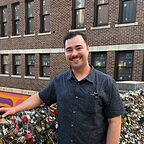Rocket from Manhattan is just as relevant today
How the story of Arch Obler’s radio play is still relevant 77 years later
Arch Obler released the radio play, “Rocket from Manhatten,” a story about three astronauts being first to land on the moon in the year 2000.
While returning to earth one of the astronauts makes a startling revelation that the moon had similar craters to the atomic bomb sites he had seen 55 years earlier in New Mexico.
“…Was it not possible that the moon had gone through the same evolutionary processes as our earth, before our earth? Yes, wasn’t it possible that men had come into being on the moon developed their own civilization, had known scientific progress as we have, but long before we earth-men had known it?… These men of the moon had discovered the secret of atomic power long before we did. And then had used it to blast and to tear each other. Yes. And the craters on the moon, that terrible devastation was the record of the destruction of their civilization. A final war which had burned up the atmosphere and left the moon a dead planet circling endlessly in an airless sky.” -Dr. Chamberlain
Arch Obler play was released in September 1945, one month after the bombings of Hiroshima and Nagasaki.
The play ends with the three men watching atomic bombs go off all over the Earth. Realizing the world had ended, they accepted their grim fate that they would circle the planet before running out of fuel and crashing.
Science fiction often warns against technological, political, social, or economic change that has created a dystopia. The idea is to paint a reality that isn’t too far off from where we are in real life, and what a nightmare it could be if we don’t make a change.
During the Cold War, nuclear annihilation was at the front of everyone’s mind. The Soviet Union and the United States came out of World War II as the global superpowers who felt threatened by each other's influence to the rest of the world.
With the technological advance of nuclear power, neither of us felt safe that we wouldn’t use bombs on each other.
This play showed a very different reality than ours in which nuclear bombs destroyed our planet because we couldn’t put aside our differences. Instead of fearing the destruction a nuclear bomb could make, we decided to make more so no one could ever threaten us.
Arch Obler created a play that warns us of the destructive path we are headed in if we continue to use atomic bombs.
And While we did not annihilate each other during the cold war, the hostilities and holding each other hostage is still present today as tensions with Russia are begining to flare up.
To eliminate the path of nuclear destruction would require political change.
Political across the board. For America, the Union of Concerned Scientists suggests the United States adopt a “No-first use” policy.
“A no-first-use nuclear policy means that the United States would commit to never being the first nation to use nuclear weapons in any conflict, a change from its current policy.”
This policy would be a good reassurance to other countries that we would not break out into nuclear war over a smaller miscalculated conflict.
But the United States is only a part of the problem. Other nations would have to develop similar agreements and treaties. At the height of the cold war, we had 64,000 warheads in 1986 to just less than 9000 world wide.
There has certainly been progress as mentioned with the above reducing rate and the play itself presents a grim future that we avoided up to this point in time, but until all warheads can become dismantled, we are still at the mercy from leaders of the world.
